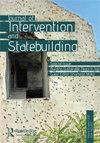What Difference Does it Make? UN Peacekeeping’s Impact on Civil-Military Relations in Troop-Contributing Countries
IF 2.3
2区 社会学
Q1 INTERNATIONAL RELATIONS
引用次数: 0
Abstract
ABSTRACT Participating in UN peacekeeping missions used to be seen as an appropriate way to improve civil-military relations in countries where armed forces held undue political power. Nevertheless, a growing body of scholarship cautions that sending troops to increasingly coercive peacekeeping missions can contribute to a deterioration of civil-military relations. How can this variance in outcomes of peacekeeping deployments be explained? Taking stock of the existing academic debate on socialisation processes in peacekeeping and comparing the cases of India and Brazil, this article argues that military role conceptions are a key factor for understanding the effects of peacekeeping on troop-contributing countries.它有什么不同?联合国维和行动对部队派遣国军民关系的影响
本文章由计算机程序翻译,如有差异,请以英文原文为准。
求助全文
约1分钟内获得全文
求助全文
来源期刊

Journal of Intervention and Statebuilding
INTERNATIONAL RELATIONS-
CiteScore
5.20
自引率
20.00%
发文量
21
期刊介绍:
The Journal of Intervention and Statebuilding is a cross-disciplinary journal devoted to critical analysis of international intervention, focussing on interactions and practices that shape, influence and transform states and societies. In 21st century political practice, states and other actors increasingly strive to transplant what they see as normatively progressive political orders to other contexts. Accordingly, JISB focuses on the complex interconnections and mutually shaping interactions between donor and recipient communities within military, economic, social, or other interventional contexts, and welcomes perspectives on political life of, and beyond, European state-building processes. The journal brings together academics and practitioners from cross-disciplinary backgrounds, including international relations, political science, political economy, sociology, international law, social anthropology, geography, and regional studies. The editors are particularly interested in specific or comparative in-depth analyses of contemporary or historical interventions and state-building processes that are grounded in careful fieldwork and/or innovative methodologies. Multi or cross-disciplinary contributions and theoretically challenging pieces that broaden the study of intervention and state building to encompass processes of decision-making, or the complex interplay between actors on the ground, are especially encouraged.
 求助内容:
求助内容: 应助结果提醒方式:
应助结果提醒方式:


